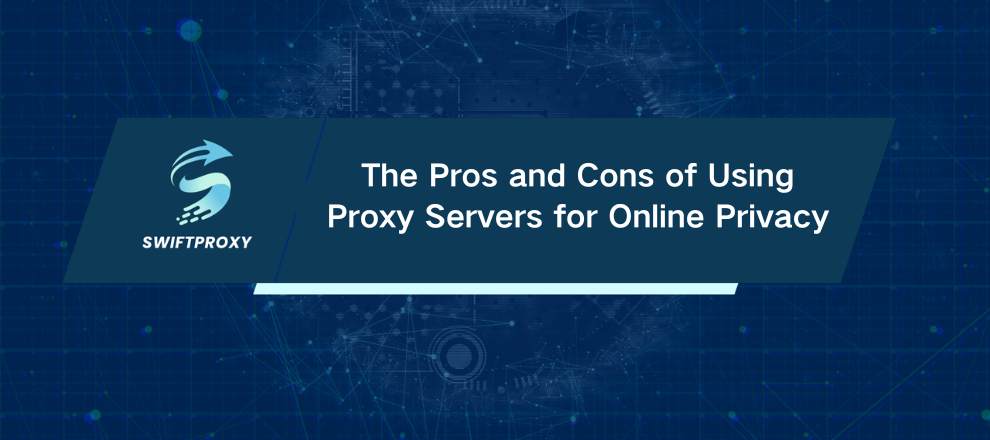The Pros and Cons of Using Proxy Servers for Online Privacy
Ever wondered what happens between your device and the websites you visit? That invisible middle layer—the proxy server—does a lot more than you think. It can mask your IP address, filter traffic, boost performance, and even help you navigate around online restrictions. But it’s not all smooth sailing. Let’s break down how proxy servers work, their advantages, drawbacks, and how to choose one that actually works for you.

Introduction to Proxy Servers
Think of a proxy server as your internet bodyguard. It sits between your device and the web, managing requests, changing IP addresses, filtering content, and sometimes even improving speed. There are several types—residential, datacenter, and mobile proxies—each designed for specific tasks.
Residential Proxy Servers
Residential proxies are linked to real devices through Internet Service Providers (ISPs), which means that your computer, phone, or even smart TV could be part of this network.
One major benefit is high anonymity, as websites see these IPs as regular users. They also allow geo-targeting, making it possible to access region-specific content or gather data for research. Another advantage is low detection, since residential IPs are harder to get blocked or flagged.
However, residential proxies come with some limitations. They generally have slower speeds compared to datacenter proxies. Their stability depends on the strength of the provider's network, and the cost can be higher depending on service quality.
Datacenter Proxy Servers
Datacenter proxies are designed purely for performance, using IPs from data centers rather than ISPs, so there is no physical device behind them.
These proxies are fast and reliable, making them ideal for activities like gaming, streaming, or general browsing. They are also usually cheaper and provide high bandwidth.
The limitations include easier detection and blocking by websites, lower anonymity compared to residential proxies, and potentially weaker security.
Mobile Proxy Servers
Mobile proxies operate through cellular networks, offering IPs from phones, tablets, or mobile routers.
They are particularly useful for mobile apps, social media, or accessing mobile-specific content. Their dynamic IPs make it easier to bypass censorship and firewalls.
On the downside, mobile proxies can be expensive, and their speed and stability heavily depend on network quality. Availability may also be limited depending on the provider.
The Pros and Cons of Using Proxy Servers
Pros:
Anonymity
Your IP is like your digital fingerprint. Hide it, and websites can't track your location, device, or habits. It also helps unlock geo-restricted content effortlessly.
Security
Proxies can filter out unwanted ads, pop-ups, cookies, or even malware. Some can modify pages—compressing them to save bandwidth or translating content to your preferred language.
Performance
Caching is the secret weapon. Proxy servers store frequently accessed web pages and files. The result? Faster loading times, less strain on servers, and a smoother online experience.
Cons:
Lack of Encryption
Not every proxy encrypts your data. Without encryption, your information can be intercepted or exposed, opening doors to identity theft or cyberattacks.
Limited Usability
Some proxies don't support all web protocols or apps. Gaming, streaming, or torrenting might be blocked or slowed down due to proxy limitations.
Security Concerns
Free proxies often log or leak your browsing history. Your personal info could end up in the hands of marketers—or worse. Paid services usually offer better security, but always check policies carefully.
How to Select a Proxy Server
Not all proxies are created equal. Here's what to consider:
Supported Protocols
HTTP, HTTPS, SOCKS5, CGI, or reverse proxies—pick one that aligns with your needs. Browsing? Go with HTTP/HTTPS. Gaming or torrenting? SOCKS5 is your friend.
Server Locations
Closer servers = faster speeds. Need to stream Netflix US from Europe? Pick a US-based proxy. Access blocked sites in China? Choose a country with open internet policies.
Safety and Privacy
Check encryption, authentication, and logging policies. For sensitive tasks like banking or shopping, HTTPS or SOCKS proxies with strong encryption are crucial. For anonymous browsing or research, residential or mobile proxies with no-logs policies are preferable.
Conclusion
Proxy servers aren't magic, but they're powerful tools when used right. They can hide your IP, filter traffic, boost performance, and give you online freedom—but they come with trade-offs like potential instability, limited protocols, and security concerns.
The key is knowing your needs and picking a proxy that aligns with them. Whether it's residential, datacenter, or mobile, the right choice can transform your online experience—making browsing faster, safer, and more flexible than ever.

















































